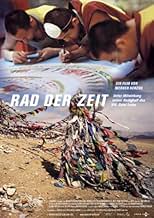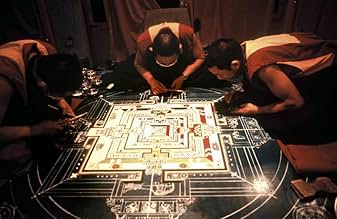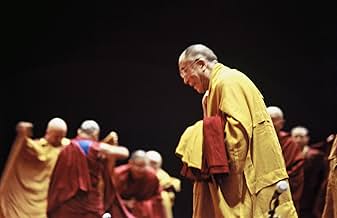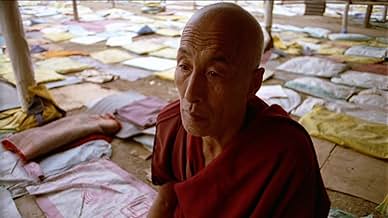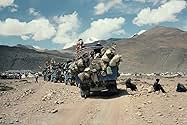NOTE IMDb
7,1/10
2,8 k
MA NOTE
Ajouter une intrigue dans votre langueWheel of Time is Werner Herzog's photographed look at the largest Buddhist ritual in Bodh Gaya, India.Wheel of Time is Werner Herzog's photographed look at the largest Buddhist ritual in Bodh Gaya, India.Wheel of Time is Werner Herzog's photographed look at the largest Buddhist ritual in Bodh Gaya, India.
- Réalisation
- Scénario
- Casting principal
Avis à la une
Famed German filmmaker Werner Herzog and his crew travel to a Buddhist pilgrimage site in Bodgaya, India. There they film the believers as they do the many tasks that they feel lead to greater enlightenment. The film's title is about a sand drawing or a 'mandala' that is created for this event.
While my summary is pretty much true of all films, it's especially true of "Wheel of Time". If you have no interest in Buddhism or don't like documentaries that are light on narration and thorough explanations, then you'll probably not enjoy this film. This isn't meant pejoratively--it's just that your interests will really have a lot to do with whether I'd recommend it to you. As a retired history teacher who often taught about world religions, I already had a reasonable understanding of many of the tenants of Buddhism as well as an interest in learning more. But I am NOT the typical person. And, I don't mind the vagueness in the narrative of this film very much--though I would have appreciated it if the film had talked about the basic beliefs of the religion. In other words, before attempting a discussion of the confusion topic of 'mandalas' (something which, it appeared, even the Dalai Lama had a hard time explaining in the film), perhaps it would have been best to discuss other aspects of the religion.
Things of interest to watch for would include the vat of tea (that's a lotta tea!), the great lengths to which some of the followers go to get there, the anticlimactic aspects of the pilgrimage and the later visit to Graz, Austria. Not for all tastes, but worth seeing if it is yours.
While my summary is pretty much true of all films, it's especially true of "Wheel of Time". If you have no interest in Buddhism or don't like documentaries that are light on narration and thorough explanations, then you'll probably not enjoy this film. This isn't meant pejoratively--it's just that your interests will really have a lot to do with whether I'd recommend it to you. As a retired history teacher who often taught about world religions, I already had a reasonable understanding of many of the tenants of Buddhism as well as an interest in learning more. But I am NOT the typical person. And, I don't mind the vagueness in the narrative of this film very much--though I would have appreciated it if the film had talked about the basic beliefs of the religion. In other words, before attempting a discussion of the confusion topic of 'mandalas' (something which, it appeared, even the Dalai Lama had a hard time explaining in the film), perhaps it would have been best to discuss other aspects of the religion.
Things of interest to watch for would include the vat of tea (that's a lotta tea!), the great lengths to which some of the followers go to get there, the anticlimactic aspects of the pilgrimage and the later visit to Graz, Austria. Not for all tastes, but worth seeing if it is yours.
`Wheel of Time' is a very good film, but I admit that it is different from what I expected from Herzog. He is still very talented, but I doubt if the subject matter is best suited to him. `Wheel of Time' concerns many things, including religion, virtue, and faith, which in this case may not be the best subjects for Herzog. But when `Wheel of Time' deals with some strange and crazy rituals, political oppression, and rugged landscapes, these parts of the film are very satisfying.
Some scenes in `Wheel of Time' are magical, especially the scenes which show vast landscapes and people performing strange rituals. Those scenes are Herzogian, I think. Nobody does this kind of thing better than Herzog. If a cinephile watches these scenes, not knowing who shot them, he or she will guess correctly that they were shot by Herzog. These scenes make `Wheel of Time' rise way above television documentaries.
But other scenes are not as magical as I expect from Herzog's films. I think that maybe the religious subject matter of this film doesn't allow Herzog to be as playful in directing as he was in other films. It is very difficult for any filmmaker, including Herzog, to make an interesting documentary about something virtuous like this. It would be much easier to make an interesting film if the film is about `good vs. evil', or about some strange rituals in which people walk on fire and pierce themselves horrifically.
I think Herzog is like a wizard, and one can hardly makes a more magical film than him if the film is about nature-made or man-made madness, brutality, or suffering in life. But because of the subject matter of `Wheel of Time', this film is not my most favorite of Herzog's. I like `Wheel of Time' as much as Herzog's `How Much Wood Would a Woodchuck Chuck' (1976) and `The Flying Doctors of East Africa' (1969). I think these three films are very good films, but because the people portrayed in these films are not `very' strange nor `very' crazy, these three films lack some kind of excitement I found in other films by Herzog, especially when compared to Herzog's `Gesualdo: Death for Five Voices' (1995), `My Best Fiend' (1999), `The Great Ecstasy of Woodcarver Steiner' (1974), and `Land of Silence and Darkness' (1971), which is my most favorite of Herzog's films.
Some parts of Herzog's `Lessons of Darkness' (1992) deal with political madness, and I think Herzog is good at this subject, too. In one scene in `Wheel of Time', a former political prisoner gave an interview about the brutality of the Chinese rule. This scene is very simple. It is just a normal interview. But for me the power of this scene is much more stronger than most scenes in `Wheel of Time'. And it also reminds me of some great scenes in `Lessons of Darkness' in which some people gave their own testimonies to what happened when Saddam invaded Kuwait. I think one thing that makes the scene about the former prisoner stand apart from other scenes in `Wheel of Time' is because this scene talks about `evil forces', while other scenes in `Wheel of Time' are about some kind of virtuous power.
Some scenes in `Wheel of Time' are magical, especially the scenes which show vast landscapes and people performing strange rituals. Those scenes are Herzogian, I think. Nobody does this kind of thing better than Herzog. If a cinephile watches these scenes, not knowing who shot them, he or she will guess correctly that they were shot by Herzog. These scenes make `Wheel of Time' rise way above television documentaries.
But other scenes are not as magical as I expect from Herzog's films. I think that maybe the religious subject matter of this film doesn't allow Herzog to be as playful in directing as he was in other films. It is very difficult for any filmmaker, including Herzog, to make an interesting documentary about something virtuous like this. It would be much easier to make an interesting film if the film is about `good vs. evil', or about some strange rituals in which people walk on fire and pierce themselves horrifically.
I think Herzog is like a wizard, and one can hardly makes a more magical film than him if the film is about nature-made or man-made madness, brutality, or suffering in life. But because of the subject matter of `Wheel of Time', this film is not my most favorite of Herzog's. I like `Wheel of Time' as much as Herzog's `How Much Wood Would a Woodchuck Chuck' (1976) and `The Flying Doctors of East Africa' (1969). I think these three films are very good films, but because the people portrayed in these films are not `very' strange nor `very' crazy, these three films lack some kind of excitement I found in other films by Herzog, especially when compared to Herzog's `Gesualdo: Death for Five Voices' (1995), `My Best Fiend' (1999), `The Great Ecstasy of Woodcarver Steiner' (1974), and `Land of Silence and Darkness' (1971), which is my most favorite of Herzog's films.
Some parts of Herzog's `Lessons of Darkness' (1992) deal with political madness, and I think Herzog is good at this subject, too. In one scene in `Wheel of Time', a former political prisoner gave an interview about the brutality of the Chinese rule. This scene is very simple. It is just a normal interview. But for me the power of this scene is much more stronger than most scenes in `Wheel of Time'. And it also reminds me of some great scenes in `Lessons of Darkness' in which some people gave their own testimonies to what happened when Saddam invaded Kuwait. I think one thing that makes the scene about the former prisoner stand apart from other scenes in `Wheel of Time' is because this scene talks about `evil forces', while other scenes in `Wheel of Time' are about some kind of virtuous power.
Werner Herzog again.
This time he is in his mode of creation more by discovery than invention, and it pays off.
The raw material is striking by itself: vast numbers, ephemeral yearnings, trivial and essential rituals. Devotion in any endeavor is something we are drawn to, and there is plenty for our filmmaker to harvest.
The essential part of this film is Herzog as camera during a gathering in India, where a variety of consecrations are planned. Monks and devotees come, some by difficult and humbling means. 400,000 faces (all attempting calmness) are miraculously organized, assembled to be led by the supreme priest.
We see queues so orderly they could only exist among such beings, but anxious chaos when fighting for tossed goodies: dumplings and candies. We have zealots, order and peace.
Into this sails Herzog. The story is that he had been cajoled into filming the much smaller gathering in Austria. Austria! He was reluctant to do so, and after the film remains firm in his belief that Austrian Buddhists don't make much sense to him. But with this commitment, he traveled to the gathering in a sacred place in India near Nepal.
There he found a focus for his film in one of the rituals. Though it is presented as central to the gathering, it is only so in Herzog's vision. This holds that mysteries can be conveyed visually. The situation needs to support the vision, but the vision is the thing. It is not the symbol, the notation, the token, but the real thing. This is how he thinks of cinema and the way he presents the sand mandala carries this import.
The "Wheel of Time" is one translation of a sand painting made for this type of gathering, as perfected and maintained by one of the groups in Tibet. Mandalas are movies and intended for meditation, as a structure existing between and shared by the mind of insight and the real world of color and structure. There is much to be said of them and cinema, but Herzog only could film this one (and its copy in Austria) as it is being made with colored sand and exhibited as devotees are rushed past it.
He then went to Mount Kailash, Though this is a couple hundred miles away, he merges it seamlessly into the gathering of nearly half a million robed prayers. Here, he is able to make some magnificent images of the mountain, its waterways and the people ritualistically circumnavigating it. This is holiness he understands and the conflation of mountain and mandala works.
As usual, the music adds great power. I believe that henceforth, I will associate that music with this devotion, though there is no relation other than Herzog chose to build his mandala of these sounds, this extract of natural rock and water, and these people. They would not recognize their devotions as shown here. (And some of this is staged.) But for me, it is a window into something more holy than they worship.
Ted's Evaluation -- 3 of 3: Worth watching.
This time he is in his mode of creation more by discovery than invention, and it pays off.
The raw material is striking by itself: vast numbers, ephemeral yearnings, trivial and essential rituals. Devotion in any endeavor is something we are drawn to, and there is plenty for our filmmaker to harvest.
The essential part of this film is Herzog as camera during a gathering in India, where a variety of consecrations are planned. Monks and devotees come, some by difficult and humbling means. 400,000 faces (all attempting calmness) are miraculously organized, assembled to be led by the supreme priest.
We see queues so orderly they could only exist among such beings, but anxious chaos when fighting for tossed goodies: dumplings and candies. We have zealots, order and peace.
Into this sails Herzog. The story is that he had been cajoled into filming the much smaller gathering in Austria. Austria! He was reluctant to do so, and after the film remains firm in his belief that Austrian Buddhists don't make much sense to him. But with this commitment, he traveled to the gathering in a sacred place in India near Nepal.
There he found a focus for his film in one of the rituals. Though it is presented as central to the gathering, it is only so in Herzog's vision. This holds that mysteries can be conveyed visually. The situation needs to support the vision, but the vision is the thing. It is not the symbol, the notation, the token, but the real thing. This is how he thinks of cinema and the way he presents the sand mandala carries this import.
The "Wheel of Time" is one translation of a sand painting made for this type of gathering, as perfected and maintained by one of the groups in Tibet. Mandalas are movies and intended for meditation, as a structure existing between and shared by the mind of insight and the real world of color and structure. There is much to be said of them and cinema, but Herzog only could film this one (and its copy in Austria) as it is being made with colored sand and exhibited as devotees are rushed past it.
He then went to Mount Kailash, Though this is a couple hundred miles away, he merges it seamlessly into the gathering of nearly half a million robed prayers. Here, he is able to make some magnificent images of the mountain, its waterways and the people ritualistically circumnavigating it. This is holiness he understands and the conflation of mountain and mandala works.
As usual, the music adds great power. I believe that henceforth, I will associate that music with this devotion, though there is no relation other than Herzog chose to build his mandala of these sounds, this extract of natural rock and water, and these people. They would not recognize their devotions as shown here. (And some of this is staged.) But for me, it is a window into something more holy than they worship.
Ted's Evaluation -- 3 of 3: Worth watching.
Werner Herzog's documentaries aren't like the documentaries of anyone else. Perhaps the best documentaries are unique to the people who make them. You can tell a Flaherty from a Wiseman just as you can tell a Maysles Brothers from a Herzog. Werner is interested in extremes, if only the extremes in subject matter. He will go out of his way to show us places and things other film-makers often ignore. "Wheel of Time" is his film about a place and an event not usually seen here in the West.
Its subject is a Buddhist initiation rite performed by His Holiness the Dalai Lama and attended by over half a million pilgrims. It's a ceremony of such complexity that Herzog's capturing of it is something of a miracle in itself and, of course, it is a thing of consumate beauty. This is what religion should be but very seldom is and Herzog is a masterful observer. He also narrates the film, informing us about what is happening when we need to know but most of the time simply showing us events as they unfold. Wonderful cinema and one of Herzog's best films.
Its subject is a Buddhist initiation rite performed by His Holiness the Dalai Lama and attended by over half a million pilgrims. It's a ceremony of such complexity that Herzog's capturing of it is something of a miracle in itself and, of course, it is a thing of consumate beauty. This is what religion should be but very seldom is and Herzog is a masterful observer. He also narrates the film, informing us about what is happening when we need to know but most of the time simply showing us events as they unfold. Wonderful cinema and one of Herzog's best films.
I just saw Wheel of Time yesterday at its premiere in Toronto, where Herzog was present. As usual, Herzog creates a compelling film: a portrait of a traditional Bhuddist initiation ceremony. Specifically, we are shown the pilgrimmage of hundreds of thousands of people to India and one year later, to a similar ceremony in Austria. On a purely documentary level, this winning film is a fascinating piece, giving insight into this ancient ceremony (including the pilgrimmage itself), as well as showing us the painstaking construction of a large "mandala" made out of colored sand, with a "wheel of time" intricately designed in its center. The interviews with the Dalai Lama were interesting and even humorous. On an artistic level, it is also a winner, as Herzog mixes stylistic poses and environmental landscapes within the structure of the documentary. Of course, Herzog's critics call this self-indulgence, but I strongly disagree. Herzog operates on a subconcious level in most of his films, including his narrative features, and actually succeeds where other "artsy" filmmakers fail miserably. Herzog has produced yet another fascinating masterpiece.
Le saviez-vous
- Citations
The Dalai Lama: All religions carry same message. Message of love, compassion, forgiveness, tolerance, contentment, self-discipline. I think we need these qualities, irrespective of whether we are believer or non-believer, because these are the source of a happy life.
- Bandes originalesHimal
Performed by Prem Rama Autari
Meilleurs choix
Connectez-vous pour évaluer et suivre la liste de favoris afin de recevoir des recommandations personnalisées
- How long is Wheel of Time?Alimenté par Alexa
Détails
Contribuer à cette page
Suggérer une modification ou ajouter du contenu manquant

Lacune principale
By what name was Wheel of Time (2003) officially released in Canada in English?
Répondre
